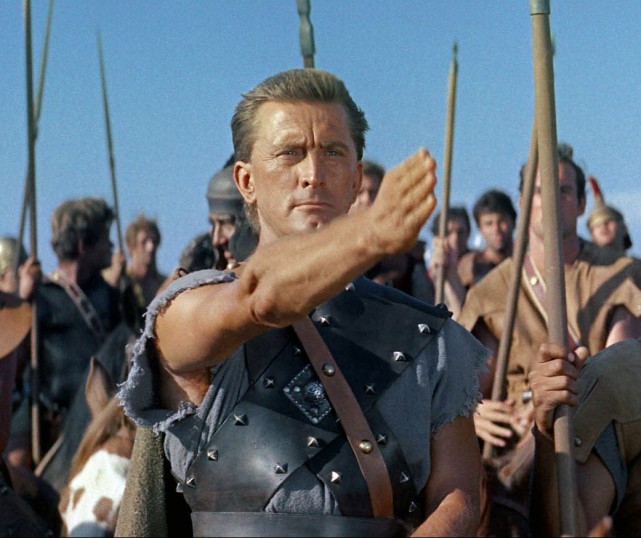
Kirk Douglas - Ten Best Films - Part II
Frank Black
12 February 2020

Spartacus (1960)
According to Douglas, Kubrick hated the scene where all of Spartacus' men claim to be him. He shot it on the star's insistence. Remember, Douglas was also the producer, who had already replaced Anthony Mann with Kubrick, and this was the only film where Kubrick didn't have full artistic control. This epic of rebellion against political tyranny was written by one Sam Jackson, the alias for the blacklisted Dalton Trumbo, who was working on reduced wages, something Douglas clearly felt ashamed about years later. Douglas shines, but so do Peter Ustinov, Charles Laughton, Tony Curtis, Jean Simmons and Laurence Olivier. Hard to believe, but at the time, there was a rival product in the works, The Gladiators, to star Yul Brynner, that Douglas was afraid would get made ahead of Spartacus - in the end, it didn't happen.
The movie was criticised when it was released for using a book by the Communist, Howard Fast, and when Douglas announced it was scripted by Trumbo. Some cinemas were picketed by the American Legion, but it was a popular film, even more so when President Kennedy cross the picket lines in Washington to see it and later praise it.

The Posse (1975)
A terrific late-period Douglas film, this was his second and final film as a director; it's a smart little Nixonian Western about a corrupt marshal, Howard Nightingale, who hunts down bank robber Jack Strawhorn (the ever-wonderful Bruce Dern appropriately looking more like someone out of the post-Watergate era than the old West) in the hope that it will boost his career in politics. However, Strawhorn kidnaps Nightingale and the tables are swiftly turned when the posse resort to robbing a the town to raise the ransom, thus turning the people against the marshal.
A terrific late-period Douglas film, this was his second and final film as a director; it's a smart little Nixonian Western about a corrupt marshal, Howard Nightingale, who hunts down bank robber Jack Strawhorn (the ever-wonderful Bruce Dern appropriately looking more like someone out of the post-Watergate era than the old West) in the hope that it will boost his career in politics. However, Strawhorn kidnaps Nightingale and the tables are swiftly turned when the posse resort to robbing a the town to raise the ransom, thus turning the people against the marshal.

Lust for Life (1956)
Douglas won the Golden Globe for Best Actor for his portrayal of Vincent Van Gogh. Anthony Quinn, playing Paul Gauguin won an Oscar for Best Supporting Actor. Although he wanted to make it using his own company, Bryna (named after his mother, Bryna Demsky and inspired by Burt Lancaster's move into production around this time), MGM owned the rights and he went to work with some of the same people from The Bad and the Beautiful, namely producer John Houseman and director Vincente Minnelli. Douglas said he enjoyed shooting the film in France but it took a while to throw off the character who had been around his age when he died. Afterwards, Marc Chagall asked him to make a film of his life story, but he couldn't bring himself to do it.

Detective Story (1951)
William Wyler's brutal portrayal of a New York detective living on the edge as he hunts down criminals, has the same dark tone as Otto Preminger's Where the Sidewalk Ends, made a year earlier in 1950. Detective Jim Grant (Douglas) obsessively pursues criminal low-lifes in New York,but his particular target is a doctor practising illegal abortions.When Grant uncovers evidence that the doctor carried out an abortion on his wife (Eleanor Parker) while she was going out with a racketeer, Tami Giacoppetti, he finds it uncomfortable to live with the knowledge.

Last Train from Gun Hill (1959)
Douglas is paired with his old sparring partner Anthony Quinn in this great, spare little Western in the mode of the excellent (original) 3:10 to Yuma. John Sturges directs Douglas and Quinn as two old friends who have gone their separate ways and operate on opposing sides of the law. Marshal Matt Morgan (Douglas) realises that the person who raped and murdered his Indian wife is the son of his old friend Craig Belden (Quinn), 'boss' of the town of Gun Hill. Belden refuses to turn over his son (Earl Holliman) and Morgan has to take on the entire town in order to get the murderer on that night's last train from Gun Hill.









No comments:
Post a Comment